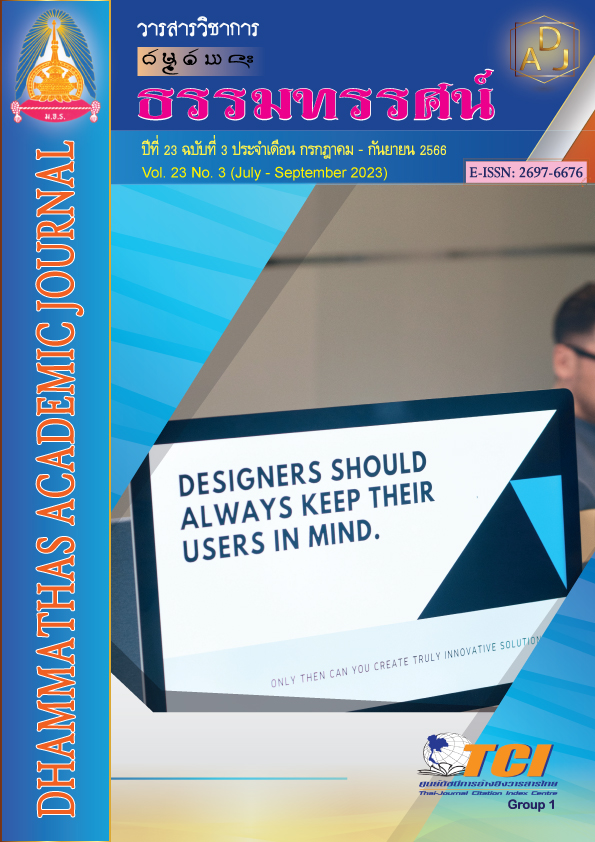A Study of Components of a Teacher Development System to Strengthen Morality and Ethics of Secondary School Students under the Office of the Basic Education Commission
Main Article Content
Abstract
The purpose of this research was to study the components and indicators of the school administration system to strengthen morality high school student ethics the process was carried out in three steps: 1) analyzing, synthesizing, documents and relevant research to determine the components in a Study of Elements and Indicators of Teacher Development System o strengthen morality and ethics of secondary school students under the office of the Basic Education Commission. 2) Create an indicator or subvariable of teacher development system system elements to strengthen morality and ethics of secondary school students under the Office of the Basic Education Commission in each area then set the appropriateness of the element in the form of questionnaire estimation (rating scale) 5 levels and 3) verification (Confirmatory) the suitability of the composition of the 7 experts by determining the components of the school administration system to strengthen morality high school student ethics.
The results showed that: The results showed that: components of the teacher development system to strengthen morality and ethics of secondary school students under the Office of the Basic Education Commission, there are 1. Main components Input side consists of 4 sub-components 2. Process side consists of 7 sub-elements 3. Output side consists of 5 sub-elements 4. Outcome side consists of 1 sub-element the results showed that components of the teacher development system to strengthen morality and ethics of secondary school students under the Office of the Basic Education Commission, there are 1. Main components Input side consists of 4 sub-components 2. Process side consists of 7 sub-elements 3. Output side consists of 5 sub-elements 4. Outcome side consists of 1 sub-elementhe feedback side consists of 2 sub-components.
Article Details

This work is licensed under a Creative Commons Attribution-NonCommercial-NoDerivatives 4.0 International License.
เพื่อให้เป็นไปตามกฎหมายลิขสิทธิ์ ผู้นิพนธ์ทุกท่านต้องลงลายมือชื่อในแบบฟอร์มใบมอบลิขสิทธิ์บทความ ให้แก่วารสารฯ พร้อมกับบทความต้นฉบับที่ได้แก้ไขครั้งสุดท้าย นอกจากนี้ ผู้นิพนธ์ทุกท่านต้องยืนยันว่าบทความ ต้นฉบับที่ส่งมาตีพิมพ์นั้น ได้ส่งมาตีพิมพ์เฉพาะในวารสาร วิชาการธรรม ทรรศน์ เพียงแห่งเดียวเท่านั้น หากมีการใช้ ภาพหรือตารางของผู้นิพนธ์อื่นที่ปรากฏในสิ่งตีพิมพ์อื่นมาแล้ว ผู้นิพนธ์ต้องขออนุญาตเจ้าของลิขสิทธิ์ก่อน พร้อมทั้ง แสดงหนังสือที่ได้รับการยินยอมต่อบรรณาธิการ ก่อนที่บทความจะได้รับการตีพิมพ์References
กระทรวงศึกษาธิการ. (2546). พระราชบัญญัติการศึกษาแห่งชาติ พ.ศ. 2542 และที่แก้ไขเพิ่มเติม (ฉบับที่ 2) พ.ศ. 2545. กรุงเทพฯ: กระทรวงศึกษาธิการ.
_______. (2561). ศูนย์ปฏิบัติการการต่อต้านทุจริต แผนปฏิบัติงานส่งเสริมคุณธรรมกระทรวงศึกษาธิการ. กรุงเทพฯ: กระทรวงศึกษาธิการ.
เฉลียว บุรีภักดี. (2544). การวิจัยเชิงระบบ. วารสารพัฒนศึกษาศาสตร์ ศาสตร์แห่งการเรียนรู้และถ่ายทอดพัฒนา, 2(1), 135-145.
ฑิฆัมพร บุญมาก. (2558). การพัฒนาระบบพัฒนาครูในด้านการจัดการเรียนรู้ของโรงเรียนขยายโอกาสทางการศึกษา. (วิทยานิพนธ์การศึกษาดุษฎีบัณฑิต). มหาสารคาม: มหาวิทยาลัยมหาสารคาม.
นริศ ภูอาราม. (2560). การพัฒนาระบบการจัดการเรียนรู้โดยใช้ชุมชนแห่งการเรียนรู้ทางวิชาชีพ สำหรับเครือข่ายโรงเรียนประถมศึกษาขนาดเล็ก. (วิทยานิพนธ์การศึกษาดุษฏีบัณฑิต). มหาสารคาม: มหาวิทยาลัยมหาสารคาม.
นิรัชกร ทองน้อย. (2556). การพัฒนาระบบการบริหารงานวิชาการที่มีประสิทธิผลในโรงเรียนประถมศึกษา. (วิทยานิพนธ์การศึกษาดุษฏีบัณฑิต). มหาสารคาม: มหาวิทยาลัยมหาสารคาม.
สำนักงานคณะกรรมการการศึกษาแห่งชาติ. (2553). พระราชบัญญัติการศึกษาแห่งชาติ พ.ศ. 2542 และที่แก้ไขเพิ่มเติม (ฉบับที่ 3) พ.ศ. 2553. กรุงเทพฯ: สำนักนายกรัฐมนตรี.
สุภาวดี อุตรมาตย์. (2554). การพัฒนาระบบการประเมินผลการปฏิบัติงานของครูโรงเรียนมัธยมศึกษา สังกัดองค์กรปกครองส่วนท้องถิ่น. (วิทยานิพนธ์การศึกษาดุษฏีบัณฑิต). มหาสารคาม: มหาวิทยาลัยมหาสารคาม.
Bertalanffy, L. V. (1993). An Outline of General Systems Theory. New York: Holt, Rinehart and Winston.

